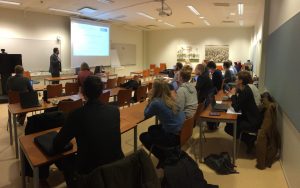
We know that work lives of women are much more complex than men in the UK. While men generally work full-time, women often move in and out of labour market, and between part-time (PT) and full-time (FT) work. How these different work trajectories of women reflect on their earnings trajectory over the life course was the focus of apresentation by Equal Lives UK team researcher Selçuk Bedük at a recent labour market workshop in Finland.
Selçuk has been using British Household Panel Survey and Understanding Society data to explore different work trajectories women follow in the UK between the ages 25 and 45, and how differences in these trajectories reflect on earnings of women over the life course.
Early results from the research shows some interesting groups other than those with largely stable FT and out-of-work experiences; for example, those who move to PT from FT around 31, those who move to part-time around 27 and then back to FT around late 30s, and those move to FT around 36 after having unstable PT or being out of work.
All the groups have similar initial wages at age 25, but their wages diverge over the life course due to stable increase in wages of stable FT group and limited increase, stall or decrease in wages of other groups.
Commenting on the early findings, Selçuk said:
Literature usually focuses on the impact of education in explaining these earnings differences. What we have found is that parental social class and family life trajectories are also important in explaining starting wage levels as well as wage increase. Especially family trajectories explain differences in wage increase much more than education – which is a very interesting finding as the accumulating effect of family lives has been largely neglected in this literature.
The workshop, organised as part of the NORFACE funded Dynamics of Inequality Across the Life-course research programme, brought together researchers from some of its 13 projects from across Europe to present early research.
